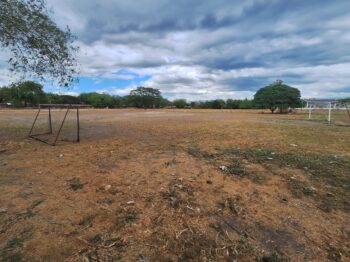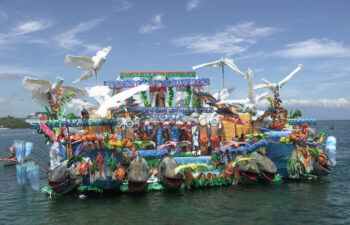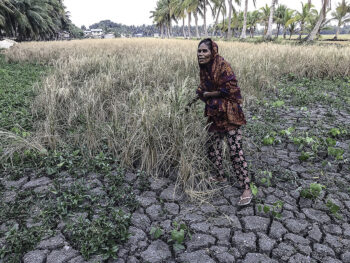
Part 3
(This is the third part of the presentation of Fr. Reynaldo D. Raluto on “Integral Ecology Ministry in Mindanao Context” at the 17th Mindanao-Sulu Pastoral Conference in Cagayan de Oro City on November 7 to 10, 2022)
The Best Ecological Practices in Mindanao Dioceses
In 1988, the Catholic Bishops’ Conference of the Philippines (CBCP) issued its first pastoral letter on ecology (“What is Happening to Our Beautiful Land?”), which highlights the emerging ecological advocacies in Mindanao. It praises “the people of San Fernando, Bukidnon and Midsalip, Zamboanga del Sur [who] defended what remains of their forest with their own bodies.” The CBCP happily narrates: “At the Santa Cruz Mission in South Cotabato serious efforts are underway to reforest bald hills and develop ecologically sound ways of farming. The diocese of Pagadian has chosen the eucharist and ecology as its pastoral focus for this year.”[1]
After three decades, it is good to inquire if there are significant developments of the ecological advocacies in Mindanao dioceses. This section attempts to highlight their best practices of caring for our Common Home based on the sub-regional reports and synodal syntheses. Let us begin with the CaBuSTaM (Cagayan-Butuan-Surigao-Tandag-Malaybalay) dioceses.
Archdiocese of Cagayan de Oro
The Agro-ecology Ministry of the Archdiocese of Cagayan de Oro (ACdO) has many ecological programs. These are what they consider as top three best ecological practices: First is the project of establishing the Hardin sa Parokya in the parishes to promote “planting the seeds of faith” and to exercise the “sacred duty to cultivate and protect” the Earth.
Second is the activity of initiating Coastal/River Clean Up, Mangrove/Tree Planting “to ensure a healthy marine ecosystem.” In the spirit of International Coastal Clean-up Day goals, a multi-sectoral initiative was initiated in several locations with the participation of residents and eco-warriors with the support of academic, business and industrial partners.
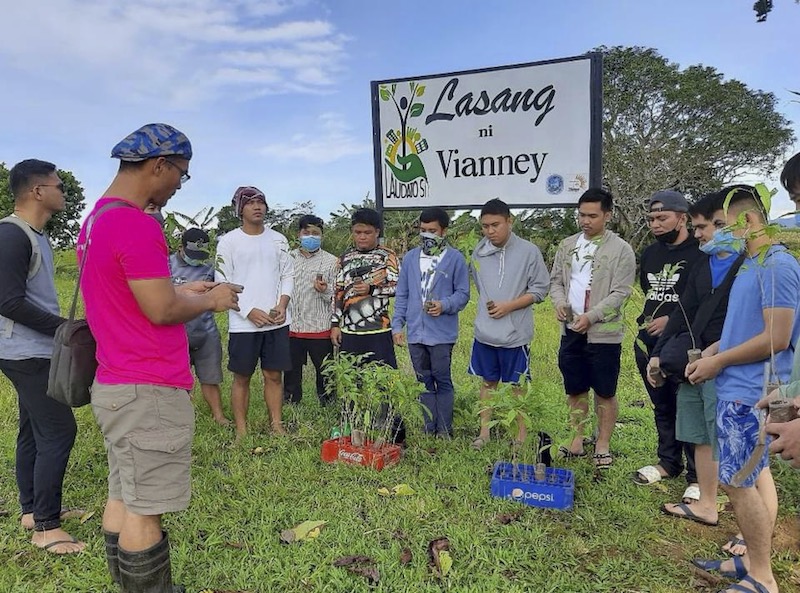
And third is the program of developing the 14-hectare St. Francis Laudato Si’ Sanctuary in Lanise, Claveria to become a space for offering “food, forest, and formation … where communion of human souls and mother nature takes place.” This sanctuary was launched on August 10, 2020 when the ACDO Clergy initially planted 1,000 endemic trees led by Bishop Emeritus Antonio Ledesma, SJ, DD.
Diocese of Butuan
The Diocese of Butuan promotes the ecological initiatives of its Diocese-owned school, Father Saturnino Urius University (FSUU). In 2009, this university convened the Taguibo Watershed Advocacy Network in order to preserve and rehabilitate the ecosystem services. Through this university, the diocese is known for its quick responses to disasters. Together with other sectors, FSUU tries to make ecological advocacy attractive to people by combining biking and planting trees.
Moreover, as Fr. Randy Odchigue reported, the FSUU personnel “have postured very publicly as an anti-mining university” by taking “a radical stance against receiving grants and scholarships from mining companies… They have organized rallies, fora, and conferences, as well as ongoing engagements with Tanggol Kalikasan and Caraga Watch on environmental issues.”[2]
The diocese also fully supports the Center for the Poor Agriculture Cooperative (CEPAGCO) run by the MSC Fathers. This is an attempt to put Laudato Si’ into action: Produces food without using chemicals, Develops Farm within the Farm, Supports Scholar Students, Provides Emergency Response to disasters, and System of Recycling Rain Water.
Diocese of Surigao
The Diocese of Surigao, through its ecology ministry, conducts and puts into action several environmental programs and activities: a weekly radio program on ecology was created to disseminate the key message of Laudato Si, proper waste management campaign, Laudato Si’ symposium participated by parish social action center (PSAC) coordinators, IP youth leaders, and some parish representatives of the diocese.
The diocese also initiated regular clean-up drive, gardening program among IP communities, diocesan tree planting was participated in by priests, nuns, and lay people in collaboration with government agencies and other organizations that have similar environmental advocacy.
Diocese of Tandag
The Diocese of Tandag tries to be consistent with its ecological commitment by making a definite policy in 2013 not to receive or ask “money or any material goods coming from mining companies, banana plantations or any other company that involves activities destructive to the environment.”[3] In fact, as early as 2011, its clergy made “a general rule, [that] no regular Masses and blessings for office or equipments (sic) in the vicinity of the mining companies.”[4]
Recently, this diocese is serious in its appropriation of the Laudato Si’ principles. With their committed bishop, the members of the Tandag clergy have made a solid stand on environment. For them, commitment to ecology “is an imperative.”
It has been reported that, in their diocese, “there is a Networking with NGO’s, POs, LGUs, Civil Society, etc. in which the diocese acts as an umbrella organization with the ecology-lover organizations,” to lobby at the LGU’s legislative body, and to connect with Water Districts officers on the concern of watersheds. They consider “the Earth Day celebration as the high light of … campaign for the environment.”
Diocese of Malaybalay
The Diocese of Malaybalay has a dramatic narrative of environmental activism, which started in 1987 when the poor farmers of San Fernando parish staged a picket against the logging companies that were operating in their watershed area.[5] Their pioneering environmental activism became a diocese-wide movement that led to the imposition of logging moratorium for the whole Province of Bukidnon in 1990.
To help the DENR implement the logging moratorium order in 1990, the 45 priests and deacons of the diocese were deputized by the DENR to confiscate logs and arrest the violators. Consequently, Fr. Nery Lito Satur (one of their diocesan priests) was brutally ambushed on October 14, 1991.[6] In 2004, a Provincial Ordinance has been issued declaring every October 14 as Fr. Neri Satur Day, which is commemorated as a working holiday by planting trees and celebrating the Holy Mass or equivalent religious rites.
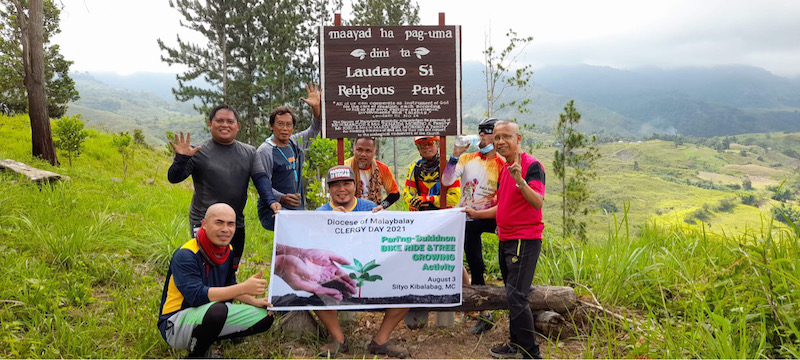
Many parishes and some individual priests in the Diocese of Malaybalay have initiated to acquire parcel of lands which they could intentionally develop into Religious Tree Parks in line with the vision of Laudato Si’. Furthermore, their diocesan College Seminary launched in 2021 a Tree of Life project, which creatively integrates reforestation program in promoting priestly vocation.
The Diocese of Malaybalay is currently organizing its Integral Ecology Ministry down to the parish and BEC levels. With this ecclesial structure, it continues the ecological advocacy of helping the DENR achieve its tasks and the practice of networking with the civil society groups in maintaining a desirable ecological balance and sustainable future.
(To be continued)
[MindaViews is the opinion section of MindaNews. Reynaldo D. Raluto is currently the parish priest of Jesus Nazareno Parish in Libona, Bukidnon in the Diocese of Malaybalay. He has also been serving as chair of the Integral Ecology Ministry of his Diocese since June 2022. Fr. Rey holds a doctorate in theology from the Katholieke Universiteit Leuven (Belgium) in 2011. Since 2011, he has been serving as Academic Dean of St. John Vianney Theological Seminary in Cagayan de Oro where he also teaches fundamental/systematic theology and Catholic social teaching. Among his ecological advocacies are planting/growing Philippine native trees, mountain climbing, and active participation in the cultural and ecological activities of the indigenous people apostolate (IPA) of the Diocese of Malaybalay. He is the author of the book Poverty and Ecology at the Crossroads: An Ecological Theology of Liberation in the Philippine Context (Quezon City: Ateneo de Manila University Press, 2015)|
[1] CBCP, “What is Happening to Our Beautiful Land?” (Tagaytay, January 29, 1988).
[2] Randy Jasper Odchigue, “Ecology and Society: Collective Action for the Environment,” in Jose Jowel Canuday and Joselito Sescon, eds., Transfiguring Mindanao: A Mindanao Reader (Quezon City: Ateneo de Manila University Press, 2022), 523-542, on p. 537.
[3] Minutes from the Presbyterium Meeting, March 5-6, 2013, Zonal Reports, page 6, lines 29-31.
[4] Minutes from the Presbyterium Meeting, December 5-6, 2011, Bishop’s Input, page 7, lines 23-27.
[5] See Karl Gaspar, A People’s Option: To Struggle for Creation (Quezon City: Claretian Publications, 1990).
[6] See Gaudencio Rosales, Fr. Neri Satur and the Church He Died For (Quezon City: Claretian Publications, 1997).


